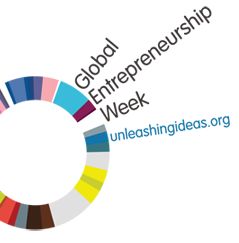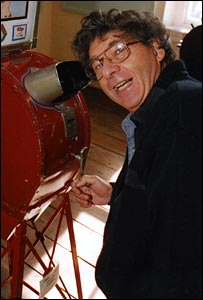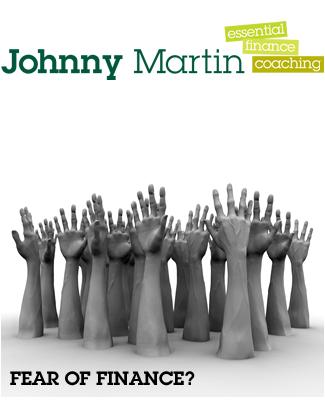Many thanks for writing a blog article about Marketing Maestros! Just a thought – if possible, would you mind adding a link to the webcasts as well? http://www.inspiringentrepreneurswebcast.co.uk/
Once again a great Inspiring Entrepreneurs panel this evening, with regular chair Matthew Rock (the founder-editor of Real Business) brining his inimitable enthusiasm to the event.
(You can still watch a webcast of the event at http://www.inspiringentrepreneurswebcast.co.uk/)
 Ajaz Ahmed Chairman of AKQA, the world’s largest independent digital agency showed some impressive examples of innovation in advertising, illustrating his point about the importance of originality.
Ajaz Ahmed Chairman of AKQA, the world’s largest independent digital agency showed some impressive examples of innovation in advertising, illustrating his point about the importance of originality.
His key message was for his company to let their work do the talking’. In other words, don’t tell you customers how great you are, show them.
 Not surprisingly Simon Calver the CEO of LOVEFILM (a £100 million turnover company) is a fan of films, and so used examples to illustrate his four P’s of business success.
Not surprisingly Simon Calver the CEO of LOVEFILM (a £100 million turnover company) is a fan of films, and so used examples to illustrate his four P’s of business success.
P1 – ‘I’m going to make you an offer you can’t refuse’ (The Godfather).
Focus on the consumer proposition first and worry about building the brand later on. The three legs which hold up his company are choice, value and convenience.
P2 – ‘Self preservation society’ (The Italian Job) i.e. Preserve the cash in the business. Make sure you focus on the time it takes to get cash in and out. If you get it right it gives you a competitive advantage. Also analyse everything you do – where you spend your cash and how you do it.
P3 – Spin City (American sitcom) Never under-estimate the importance of PR. In his case they have three targets, their investors, trading partners and of course their consumers. You have to be constantly creating new stories about your business the papers will want to publish.
P4 – Passion (a choice of seven films according to Wikipedia) Make sure you surround yourself with great people from the beginning. ‘Fiirst division people recruit first division people’, which makes the business great. Make sure you have fun too. Simon hosts a monthly BBQ for his colleagues. Also reward your people on a quarterly basis (in the case of LOVEFILM bonuses of between 10 and 20%. This allows for more flexibility in changing targets in a fast growing business.
In conclusion, starting a business is probably the most rewarding thing you can do in your life.
 Tristram Mayhew the founder and ‘Chief Gorilla’ of Go Ape, the UK’s leading forest-based adventure company talked about Gorilla marketing.
Tristram Mayhew the founder and ‘Chief Gorilla’ of Go Ape, the UK’s leading forest-based adventure company talked about Gorilla marketing.
Instead of focussing on their specific activities Go Ape are branding themselves as ‘creating adventures’, and are encouraging everyone to live life more adventurously.
Gorilla marketing means turning your customers into an effective free sales force. These are his tips:
1. Wow them with what you do.
2. Delight them – turn complainers into ambassadors.
3. Build a trust and charm based relationship
4. … and they will buy more, and more often – Tristram openly admitted that many of their ideas have been borrowed from the Innocent drinks company.
5. Innovate, validate, cultivate.
 Tristram strongly recommended The Brand Gap, it is very readable and nice and short too.
Tristram strongly recommended The Brand Gap, it is very readable and nice and short too.
They are building a loyalty base using Tribe magazine (published every 6 weeks) to reinforce brand values.
They also make use of Social Media such as encouraging customers to post videos on YouTube, and have nearly 5,000 to date with hundreds of thousands of views.
By ‘making friends’ with existing adventure bloggers and giving them free Go Ape experiences they hope to generate positive reports online.
‘Doing good things.’ For example to help support gorillas in Rwanda 25 staff and 85 customers completed a fun run dressed as gorillas.
 Will King is the ‘King of Shaves’, creator of the cult shaving brand that has overtaken Wilkinson Sword and Nivea to become number two to Gillette in the UK shaving market.
Will King is the ‘King of Shaves’, creator of the cult shaving brand that has overtaken Wilkinson Sword and Nivea to become number two to Gillette in the UK shaving market.
After 16 years of building the brand Will launched his own razor the Azor one year ago almost to the day. They already have up to 10% market share in the UK.
Lessons learnt:
The Harvard rule of 4
1. No one has it
2. Every one will have it
3. Price for profit
4. Price for sale
 Take an existing product and make it better – eg iPhone, Innocent smoothies.
Take an existing product and make it better – eg iPhone, Innocent smoothies.
Change constantly, push boundaries – it also helps to generates news stories for PR coverage.
Will introduced his SPACE strategy, which stands for Satisfaction of Success, Passion and Persistence, Attitude of Action, Confidence and Communication and Enthusiasm and Enjoyment.
There is a great degree of satisfaction in succeeding. If you achieve great satisfaction, whatever that is, it may be having children or running a marathon, but you’ve got to work at that. There’s no substitute for hard work to get that satisfaction of success, which feeds on to the passion and persistence bit. Things don’t happen overnight, it takes years to become truly successful..
You’ve got to have a can-do attitude to get things done; if you can’t be bothered who else will? The confidence and common sense part relates to having confidence in yourself and what you’re doing but not being delusional; if you try to take on Apple with an iPhone it’s a big ask, but if you want to come up with a cover to protect the iPhone clearly that’s something you could do.
There’s a certain amount when you’ve got to have confidence beyond the success that you don’t enjoy, especially when you’re starting out – people won’t give you credit, people don’t believe you’re going to do it, people think you’ll go bust, you’ll owe them money, and you’ve got to imbue them with confidence if you’re going to be successful.
And finally the enthusiasm and enjoyment piece; if you’re not enjoying it then nobody else is, especially if you’re leading a business. So have enthusiasm, have an edge about what you’re about to do because people do look to you, especially if you’re running a business or are involved in senior management. If you can’t get them motivated by transferring your enthusiasm to them, then how are they going to transfer their enthusiasm either to the products you sell or to the services you provide? They’re not.


 Another late night for me last Thursday night. This time to attend the
Another late night for me last Thursday night. This time to attend the  Although I had not been following the
Although I had not been following the  In just over a months time it will be
In just over a months time it will be 
 Given the enthusiasm of my colleague Clare Harris who organised the event, I’m hoping this will be the first of many Meet the Mentor evenings.
Given the enthusiasm of my colleague Clare Harris who organised the event, I’m hoping this will be the first of many Meet the Mentor evenings.






 Ajaz Ahmed Chairman of
Ajaz Ahmed Chairman of  Not surprisingly Simon Calver the CEO of
Not surprisingly Simon Calver the CEO of  Tristram Mayhew the founder and ‘Chief Gorilla’ of
Tristram Mayhew the founder and ‘Chief Gorilla’ of 
 Will King is the ‘
Will King is the ‘



